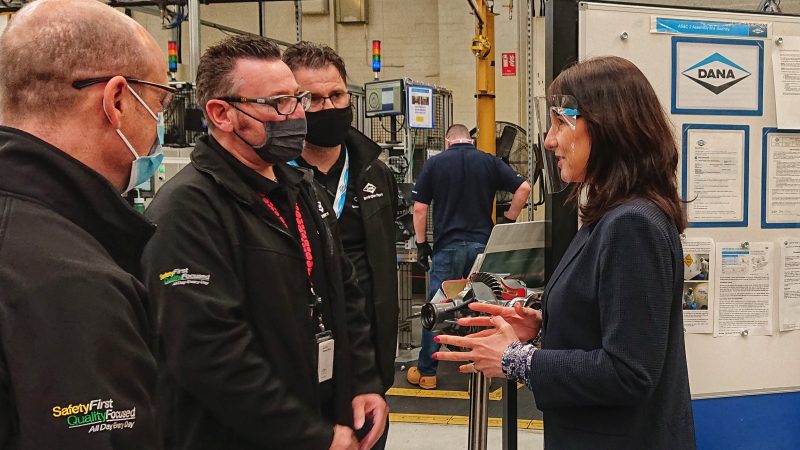
Labour’s annual conference starting this weekend will continue the party’s focus on promoting ‘securonomics’ as a response to the pervasive insecurity experienced by diverse sections of the electorate in the workplace and elsewhere.
Labour’s agenda represents an increasingly confident attempt to link this with the global security challenges posed by Russia’s reinvasion of Ukraine, Western tensions with China, and the seismic economic shifts required by climate crisis and deglobalisation.
This is inspired by Bidenomics in the US. But Labour’s vision differs not least because the UK simply does not have the financial firepower to invest in the way seen with the Inflation Reduction Act, which secures jobs through green transition and a more strategic geopolitical stance.
To make securonomics work, then, it is perhaps better to look to nearer neighbours than the US.

Learning from the European centre-left
That is exactly what we have been doing in a recent project for the Foundation for European Progressive Studies and Progressive Britain.
Following a launch at last year’s Labour conference, we have convened a series of roundtables bringing together social democratic politicians, policymakers, trade unionists and academic experts in the UK, Sweden and Germany.
Seeking inspiration for a new politics of work forged from an age of change and crisis, the roundtables sought to import back to the UK some of the best practice of social democrats elsewhere in Europe with longer-standing or more recent governmental experience of building institutions for industrial strategy and industrial relations.
This work has resulted in a policy study launched today, A Progressive Politics of Work for an Age of Unpeace: What Labour can Learn from the European Centre-Left.
The levers of power
At the centre of its agenda for greater security is Labour’s bold agenda for growth and a focus on productivity, including reform of the UK’s labour laws and employment rights. As senior Labour figures have described it, the party will be pro-business and pro-worker.
The reality of institutional and cultural reform are more difficult than simply proposing legislation, and an incoming government needs to think about delivery as much as promise.
A Labour government will be confronted with severely weakened levers of policy administration and traditional labour market institutions usually relied on to mediate and coordinate partnership and compromise in the economy.
Moreover, lagging growth and productivity diminish the resources available to the state to fund redistributive policies that tackle negative outcomes after the fact.
In light of these challenges, Labour’s task is to develop a more careful approach that balances short-term wins with long-term goals, including testing and innovating policy before widescale adoption.
We suggest that, as in previous historic crises, Labour must link the global and local to build the case for a transformative agenda.
Securonomics provides a banner to draw this approach together, but attempts to flesh this out must go further and deeper in making the connection between the bigger picture and everyday working lives and livelihoods for the country’s workers and their communities.
An age of unpeace
This should be seen in the context of what Mark Leonard calls the ‘age of unpeace’—the interconnection enabled by globalisation paired with hostile competition that borders on (or breaks out into) confrontation and war.
This is epitomised in the illegal Russian reinvasion of Ukraine, the increasingly assertive role China is playing across a range of fronts, the challenge for tech dominance, and the robust response posed by the Biden administration in the US via its Inflation Reduction Act.

In this context we contend that the centre-left can look to the social democratic past, where a social and industrial compromise with workers and their unions at its heart played a vital part in enabling liberal democracies to face the challenge of geopolitical contestation in the mid-twentieth century.
During the first Cold War, the world was divided between two blocs within which there was some trade and interchange between relatively national systems of production forged from the wartime economies.
These conditions underpinned the greater bargaining heft that workers, their unions and communities wielded in that period, both in the workplace and on the political stage via social democratic parties and neocorporatist industrial relations frameworks. As the largely closed world economy began to open for business with the onset of globalisation, that power waned.
A British Zeitenwende?
The question is whether today, whilst regrettable in many ways, the fragmentation of the global order and global economy, and the greater strategic and national security significance granted key industries, present new opportunities for the restoration of some of the forms that countervailing power assumed in the past.
Our roundtables have found that Germany’s Zeitenwende provides a potential model for how to house a new politics of work and industrial strategy within a wider reset on foreign policy posture.

The roundtables heard how the UK, too, needs a ‘British Zeitenwende’ of its own – such as that proposed by Paul Mason – to coordinate its readiness and resilience across multiple industries, government departments and areas of everyday life.
The role of work and workers is sometimes absent from this intensifying sense of a historical turning point, but the current moment creates an opportunity for the centre-left, symbolised by the Labour Party in the UK, to make the case for how this turning point presents an opportunity to build a better world of work.
Securonomics and the shopfloor
We argue Labour’s cornerstone commitments on employment reforms should be presented as part and parcel of building a more secure economy and society capable of withstanding the threats posed by the age of unpeace.
In short, the politics of work is integral to wider conversation already ensuing on national, economic and energy security.
This would be a strategic and constructive way to advance arguments for its existing agenda into new areas and new audiences—stressing the pressing contemporary need for social partnership, strengthened workers’ rights and the creation of new institutions to represent and mediate the labour interest, whilst relating this to previous periods of upheaval where such compacts were necessary.
Situating the necessity of a new politics of work within the context of this changing political economy, we suggest, will help lend Labour’s agenda weight and strengthen consensus against electoral and ideological headwinds.
In the time we have been working on this project, the Labour Party has made considerable progress on this front, establishing the concept of security as something of a red thread linking seemingly disparate spheres of frontbench policymaking.
But it needs to look to countries like Sweden and Germany in going bolder and deeper in connecting securonomics to the shopfloor.
Securonomics in practice
The established industrial economies found in Sweden and Germany are very similar to those implied in Labour’s driving vision of securonomics. This recasts Britain as a producer of goods, energy and resources and a trading partner of trusted allies, promising an economy that provides sustainable, skilled livelihoods in a range of productive, social, and extractive industries.
However, our policy study suggests that the search for this security will not be all plain sailing, and the industrial transition it necessitates also implies risks and insecurities of its own for those workers and communities whose skills or careers are upended in the process.
Think of the frictions already emerging around the economic costs and compromises of the net zero transition, or the reskilling required to achieve greater sovereign capability in key industries.
In this sense Labour can learn much from the likes of Sweden and Germany about how to achieve security in practice.
Their policies enable adaptive flexibility on the basis that in an economy based on making and trading goods and resources on uncertain global markets, security can never be total and complete. Flexibility and freedom in the way that work is governed and organised is, perhaps a little counterintuitively, seen as an aid rather than hindrance to security.
In particular, our policy study suggests that Labour should examine the Swedish Job Security Councils and German Regional Transformation Councils, which bring social partners together to manage industrial change in specific localities, matching workers with skills and skills with jobs.
Job Security Councils and Regional Transformation Agencies provide a potential model for how to translate Labour’s securonomics on the ground by enabling workers to navigate and take advantage of the economic shifts this agenda implies with the right protections in place to weather the upheaval.
Security and flexibility
The way that countries like Sweden and Germany anchor security in flexibility is also represented in the structure of their bargaining arrangements.
Our policy study argues that the experimental approach found in the systems of our European partners represents a nimbler route to consensus and concrete gains than the introduction of full-scale sectoral collective bargaining overnight. The impressive achievement of the Swedish model of industrial relations is the outcome of several decades of piecemeal steps in the right direction.

Here, Labour can take inspiration for how to adopt an agile and experimental approach to regulating work in specific circumstances that sidesteps the substantial challenges it will face in government.
To give one example of where such experimentation might be possible, we suggest that Labour should learn from the processes that have been established in Germany and Sweden for workers and their unions to be active participants in how digital transformation is rolled out and regulated in the workplace.
Sectoral experimentation
The Swedish experience should also reassure Labour that policy experimentation only in certain specific or strategic sectors – as proposed in its New Deal for Working People – is not a sign of weakness but rather pragmatic strength.
Labour is taking an initial step in this direction through its proposals to bring Fair Pay Agreements from New Zealand to the UK, with a pilot in the social care sector initially.
Moreover, Germany has innovated with forms of decentralised bargaining based on the capacity to deviate from norms and regulations in response to the specificities of different sectors. Labour’s Fair Pay Agreements could act as a basis for this. Where recognition is in place, they could permit adaptations of prevailing rules and regulations depending on the needs of the industry.
Strategic pressure points
In our policy study, we suggest additional sectors that Labour should consider as sites for experimentation with new policy approaches to work and employment that seek to develop social partnership in new ways.
In line with the opportunities Labour’s securonomics agenda senses in a more dangerous and divided world, these sectors represent strategic points at which to push in pursuit of better work.

Owing to the shifting geopolitical stakes of the present moment, we suggest that the defence sector and allied industries act as a potentially strategic site in which to pioneer new partnership approaches to bolstering skills and productivity.
Meanwhile, the green industries—including offshore renewables and critical minerals and metals—present a sectoral context in which to innovate with new ways to smooth and stabilise transitions for workers and their communities in inherently uncertain circumstances – including through measures like Job Security Councils and Regional Transformation Agencies.
The statecraft of security
The Labour Party goes into its annual conference looking eagerly to an election and possible government. Labour’s agenda goes with the grain of several profound social, political and economic shifts.
But it is nonetheless necessary to recognise the massive challenges, strategic and institutional, that limit Labour’s ability to say it will achieve everything it might wish to in the first term of a new government.
In this sense, the underlying task confronting Labour is to define the statecraft of security in domestic terms, whilst granting workers and unions room to move and the tools to struggle for a better world of work.
However, before Labour can even begin addressing all of this, it will be necessary to secure majorities and this means securing the stories that social democrats tell against competing priorities and principles.
Our policy study suggests that the concept of ‘security’ will be central to this effort.




More from LabourList
Letters to the Editor – week ending 1 March 2026
‘I spent years telling workers the law couldn’t help them – that has changed’
Josh Simons resigns as Cabinet Office minister amid investigation